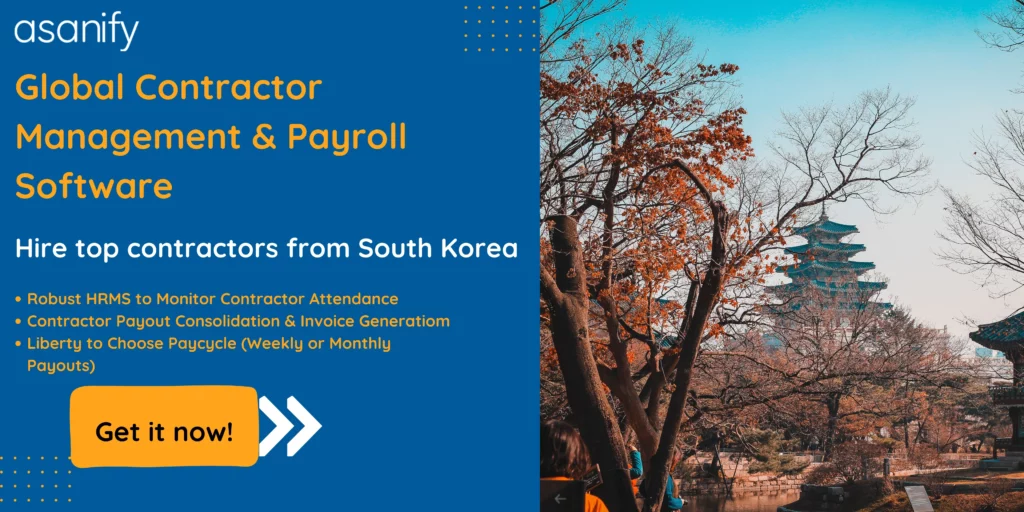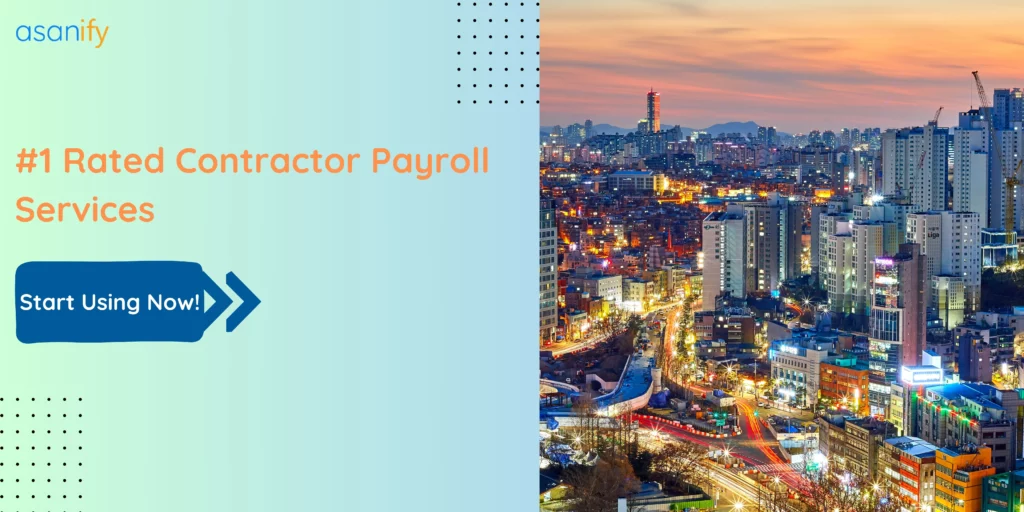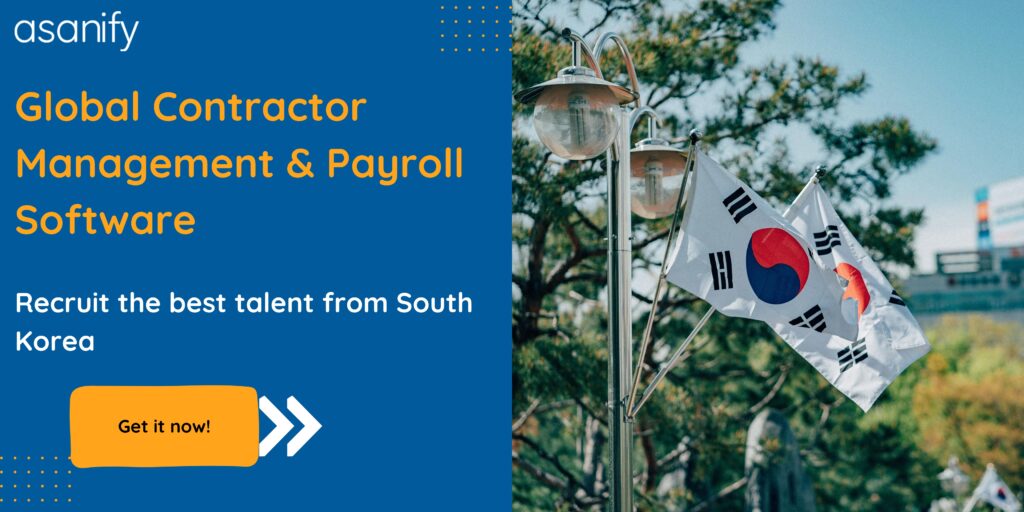In today’s increasingly globalized world, many businesses are expanding their operations beyond their home country. South Korea, with its strong economy and vibrant business environment, has become an attractive destination for companies looking to hire independent contractors. If you’re wondering how you can hire and pay contractors in South Korea, this comprehensive guide will provide you with all the information you need to navigate the process successfully.
Contents
- Who is an Independent Contractor in South Korea?
- How is an independent contractor in South Korea different from an Employee?
- Penalties for Contractor and Employee misclassification in South Korea
- What are the Labor Laws in South Korea?
- Steps to Hire a Contractor in South Korea
- Important Considerations for Hiring and Managing Contractors in South Korea
- How to draw up an independent contractor agreement in South Korea
- Do’s and Don’ts of Designing an Independent Contractor Agreement to Hire and Pay Contractors in South Korea
- How Payroll Works When You Move Ahead to Pay Contractors in South Korea
- Tax Filing Requirements for Contractors in South Korea
- Tax Compliance for US-based Companies to Hire and Pay Contractors in South Korea
- Minimum Wages for Contractors in South Korea
- Best Ways to Pay Contractors in South Korea
- Currency and Other Considerations to Pay Contractors in South Korea
- Tax and Other Payroll Costs for Contractors in South Korea
- Termination or extension terms for independent contractors in South Korea
- How do I Convert an Independent Contractor in South Korea to an Employee?
- Quick Wrap Up
- Frequently Asked Questions
Who is an Independent Contractor in South Korea?
Before diving into the details, it’s essential to understand who exactly is considered an independent contractor in South Korea. An independent contractor is an individual who provides services to a company but does not have an employment relationship. They operate independently and are responsible for their own taxes, insurance, and other financial obligations.
Independent contractors often have specialized skills or expertise that businesses require on a project-by-project basis, making them a flexible and cost-effective alternative to hiring permanent employees.
South Korea, known for its vibrant economy and technological advancements, has seen a significant rise in the number of independent contractors in recent years. This trend can be attributed to various factors, including the changing nature of work and the increasing demand for specialized services.
1. Freedom and Flexibility
One of the main advantages of being an independent contractor in South Korea is the freedom and flexibility it offers. Unlike traditional employees, independent contractors have the autonomy to choose their clients and projects. They can decide when and where to work, allowing them to create a work-life balance that suits their needs.
2. Higher Earning Potential
Independent contractors in South Korea often enjoy higher earning potential compared to their employed counterparts. Since they are not bound by fixed salaries or hourly rates, they have the opportunity to negotiate their fees based on the value they bring to the table. This can result in higher income and financial stability.
However, being an independent contractor also comes with its challenges. Without the security of a regular paycheck, contractors must carefully manage their finances and plan for periods of potential income fluctuations. They need to ensure they have a solid client base and maintain a steady stream of projects to sustain their business.
Another aspect that independent contractors in South Korea need to consider is the legal and regulatory framework surrounding their work. While they enjoy certain freedoms, they must comply with tax laws and regulations specific to their status. Understanding these obligations and seeking professional advice is crucial to avoid any legal issues or penalties.
In conclusion, independent contractors in South Korea play a vital role in the country’s economy by providing specialized services and contributing to its growth. Their flexibility, higher earning potential, and the opportunity to shape their own careers make them an attractive option for both businesses and individuals seeking a dynamic work arrangement.
Also Read: Pay Contractors in India- The Ultimate Hiring Guide
How is an Independent Contractor in South Korea Different from an Employee?
|
Parameters |
Independent Contractors |
Employees |
| Level of control | Independent contractors have more autonomy in how they perform their work, as they are hired to complete a specific task or project. | Employees typically work under the direct supervision and control of their employers, following specific instructions and guidelines. |
| Tax implications | Independent contractors are responsible for managing their own taxes and contributions, including filing their tax returns and making social security payments. | For employees, their employers are responsible for withholding income tax, national pension contributions, and health insurance premiums from their salaries. |
| Benefits | Independent contractors are not eligible for any benefits and must negotiate their own terms and conditions with their clients. | Employees are entitled to various benefits mandated by the Labor Standards Act, such as paid leave, severance pay, and employment insurance. |
| Legal Obligations | Independent contractors, being self-employed, are responsible for their own legal compliance and must ensure they meet all relevant regulations in their field of work. | Employers have a range of legal responsibilities towards their employees, including providing a safe working environment, adhering to labor laws, and ensuring fair treatment. |
Suggested Read: Hire Employees in India Through EOR- Your Go-to Guide
Penalties for Contractor and Employee Misclassification in South Korea
Misclassifying workers in South Korea can have severe consequences for businesses. If a worker is misclassified as an independent contractor when they should be an employee, the business may face legal penalties, including fines and repayment of unpaid wages and benefits.
To ensure compliance with South Korean labor laws, it is crucial to carefully review the nature of the work relationship and consult with legal experts if necessary. Taking proactive measures to avoid misclassification issues will save your business from unnecessary financial and legal burdens.
South Korea has implemented strict regulations to prevent worker misclassification and protect the rights of employees. The country’s labor laws clearly define the criteria for determining whether a worker should be classified as an employee or an independent contractor. These criteria include factors such as the level of control exerted by the employer, the nature of the work performed, and the degree of economic dependence on the employer.
1. Deprivation of Benefits and Protections
When a worker is misclassified as an independent contractor, they lose access to various benefits and protections that employees are entitled to under South Korean law. These benefits include minimum wage, overtime pay, paid leave, social security contributions, and insurance coverage. By misclassifying workers, businesses not only violate labor laws but also undermine the well-being and livelihood of their employees.
2. Imposition of Fines & Financial Liabilities
The penalties for misclassification can be significant. In addition to fines imposed by the government, businesses may be required to repay the misclassified workers for any unpaid wages and benefits. This can result in substantial financial liabilities, especially if the misclassification has been ongoing for an extended period. Moreover, businesses may also face reputational damage and loss of trust from their employees and the public.
To avoid misclassification issues, businesses should conduct a thorough analysis of the work relationship with each worker. This analysis should consider factors such as the level of control exercised by the employer, the integration of the worker into the business operations, the provision of tools and equipment, and the presence of a written contract. It is advisable to seek legal advice to ensure compliance with the specific requirements of South Korean labor laws.
Furthermore, businesses should maintain clear and accurate records of the work performed by each worker, including the hours worked, tasks performed, and payments made. These records can serve as evidence in case of any disputes or investigations regarding worker classification.
By proactively addressing worker classification issues, businesses can protect themselves from potential legal and financial risks. It is essential to prioritize compliance with South Korean labor laws and ensure that workers are properly classified and provided with the rights and benefits they are entitled to.
Also Read: Employee Misclassification- The Key to Avoiding Hefty Penalties
What are the Labor Laws in South Korea?
For Employees
1. Working Hours
The standard workweek is 40 hours, and any work beyond that is considered overtime. The maximum limit for overtime is set by law.
2. Overtime Pay
Overtime work is generally compensated at a higher rate. The specific rates depend on various factors, such as the number of hours worked beyond the standard workweek. Usually, overtime work is compensated at 150% of an employee’s salary. However, for extra work done after 10 pm, the overtime compensation rate is fixed at 200%. While there is no daily overtime limit for employees, weekly overtime limit ought not exceed 12 hours.
3. Leave
Employees are entitled to various types of leave, including annual paid leave, sick leave, and special leave (e.g., maternity leave). Employers are required to provide a minimum number of paid vacation days. Let’s have a detailed breakdown of the quantum of leave types offered to employees in South Korea.
- Annual Leave: 11 days in the first working year followed by 15 days in the second and third years. After the completion of the third year, one day’s paid leave gets added for every two working years, summing up to 25 days altogether.
- Carer’s Leave: Till 90 days.
- Maternity Leave: 90 days of leave before and after childbirth/120 days in case of a multiple birth, along with-
- 60 days of paid leave (in case of a single birth);
- 75 days of paid leave (in case of a multiple birth)
- Paternity Leave: For a period of 10 days to be taken within 90 days of the birth of the child.
- Education Leave: Working hours of an employee can be reduced to a range varying from 15 to 30 hours per year.
4. Termination
Employers must have justifiable reasons for terminating an employee. Unfair dismissal is prohibited, and severance pay may be required depending on the circumstances and length of service. As severance pay, a month’s salary for every year of uninterrupted employment with the employer ought to be paid within 14 calendar days after the termination of an employee.
For Contractors
1. Contractual Agreements
Contractors typically operate under separate contracts, detailing the terms and conditions of their work. Make sure to negotiate the terms of the contract, including compensation and duration, with the contractor.
2. Taxation
Contractors are responsible for handling their own taxes and social insurance contributions.
3. Working Hours and Compensation
Contractors often have more flexibility in setting their working hours and negotiating compensation compared to employees.
Common Regulations for Both
1. Equal Treatment
Both employees and contractors are entitled to equal treatment and protection against discrimination based on factors such as gender, age, and nationality.
2. Health and Safety
Employers are obligated to provide a safe working environment for all workers, including employees and contractors.
Also Read: Pay Contractors in Thailand- The Ultimate Guide to Hiring
Steps to Hire a Contractor in South Korea
Once you have determined that hiring a contractor is the right choice for your business, you need to follow a series of steps to ensure a smooth hiring process. These steps include:
Step 1- Identifying your business needs: Clearly define the skills and qualifications you require from a contractor
Before you begin the process of hiring a contractor in South Korea, it is crucial to identify your business needs. Take the time to clearly define the specific skills and qualifications you require from a contractor. This will help you narrow down your search and find the most suitable candidate for your project.
Step 2- Sourcing potential contractors: Look for contractors through online platforms, industry networks, or recommendations
Once you have a clear understanding of your business needs, it’s time to start sourcing potential contractors. There are several ways you can find contractors in South Korea. One option is to explore online platforms that connect businesses with contractors, such as freelance marketplaces or specialized contractor directories. Additionally, you can tap into industry networks and seek recommendations from colleagues or other businesses in your field.
Step 3- Evaluating candidates: Assess the qualifications, experience, and references of potential contractors to find the best fit for your business
After you have compiled a list of potential contractors, it’s important to thoroughly evaluate each candidate. Assess their qualifications, experience, and references to determine if they are the right fit for your business. Take the time to review their portfolios, check their previous work, and reach out to their references to gain insights into their skills and professionalism.
Step 4- Negotiating the terms: Discuss the project scope, deliverables, timelines, and payment terms with the selected contractor
Once you have identified a contractor who meets your requirements, it’s time to negotiate the terms of the project. Schedule a meeting or arrange a call to discuss the project scope, deliverables, timelines, and payment terms in detail. This negotiation phase is crucial to ensure both parties are aligned and have a clear understanding of the project expectations.
Step 5- Signing an agreement: Draft a comprehensive independent contractor agreement that protects both parties’ rights and responsibilities
After the negotiation phase, it’s essential to formalize the agreement between you and the contractor. Draft a comprehensive independent contractor agreement that clearly outlines the rights and responsibilities of both parties. This agreement will serve as a legal document that protects both you and the contractor throughout the duration of the project.
Following these steps will help you find and hire the right contractor for your business and establish a mutually beneficial working relationship.
Also Read: Invoice for Contractors- The Guide to Making an Ideal One!
Important Considerations for Hiring and Managing Contractors in South Korea
When hiring and managing contractors in South Korea, there are several important considerations to keep in mind:
- Contracts and agreements: Clearly outline the terms of the working relationship in a well-drafted contract to avoid misunderstandings.
- Language and cultural differences: Be mindful of language and cultural barriers that may arise when working with contractors in South Korea.
- Intellectual property rights: Clarify ownership and usage rights of intellectual property created by the contractor during the project.
- Confidentiality and data protection: Protect your company’s sensitive information by including confidentiality clauses in agreements.
- Communication and reporting: Establish clear lines of communication and reporting to ensure effective collaboration and project management.
By considering these factors, you can build a strong working relationship with your contractors and ensure successful project outcomes.
1. Contracts and Agreements
Contracts and agreements are crucial when hiring and managing contractors in South Korea. It is essential to clearly outline the terms and conditions of the working relationship to avoid any misunderstandings or disputes in the future. A well-drafted contract should cover important aspects such as project scope, deliverables, payment terms, and termination clauses.
2. Language & Cultural Differences
Language and cultural differences can pose challenges when working with contractors in South Korea. It is important to be mindful of these barriers and take necessary steps to bridge the communication gap. Hiring a bilingual project manager or using professional translation services can help facilitate effective communication and ensure that both parties are on the same page.
3. Intellectual Property Rights
Intellectual property rights should be addressed upfront to protect the interests of all parties involved. Clearly define ownership and usage rights of any intellectual property created by the contractor during the project. This will help avoid any potential conflicts regarding the ownership and commercialization of the project’s outcomes.
4. Confidentiality & Data Protection
Confidentiality and data protection are critical considerations when working with contractors in South Korea. Including confidentiality clauses in the agreements can help safeguard your company’s sensitive information. It is important to clearly define what constitutes confidential information and outline the measures that need to be taken to protect it.
5. Clear Communication
Establishing clear lines of communication and reporting is essential for effective collaboration and project management. Regular communication updates and progress reports will help ensure that the project is on track and any issues or challenges are addressed promptly. Utilizing project management tools and software can also streamline communication and enhance overall project efficiency.
By considering these important factors, you can build a strong working relationship with your contractors in South Korea. This will not only help you achieve successful project outcomes but also foster a positive and productive working environment for all parties involved.
How to Draw up an Independent Contractor Agreement in South Korea
An independent contractor agreement is a crucial document that outlines the terms and conditions of the working relationship between your company and the contractor. When drawing up an independent contractor agreement in South Korea, it’s essential to address specific components, including:
- Scope of work: Clearly define the project scope and deliverables expected from the contractor.
- Payment terms: Specify the payment structure, rates, and schedule to ensure transparency and avoid disputes.
- Confidentiality and non-disclosure: Protect your business’s proprietary information by including clauses that safeguard confidential data.
- Intellectual property rights: Determine ownership and usage rights of any intellectual property created during the engagement.
- Termination clauses: Clearly outline the conditions under which either party can terminate the contract.
Working with legal professionals experienced in South Korean labor laws can help ensure that your independent contractor agreement adheres to all relevant regulations and protects your rights as an employer.
Recommended Read: Pay Contractors in Mexico- The Complete Hiring Guide You Need!
Do’s and Don’ts of Designing an Independent Contractor Agreement to Hire and Pay Contractors in South Korea
Designing an independent contractor agreement to hire and pay contractors in South Korea requires careful attention to legal, cultural, and business considerations. Here are detailed do’s and don’ts to guide you through the process:
Do’s
1. Define Contractor Status Clearly
Do: Explicitly state that the engagement is that of an independent contractor. Clearly outline the contractor’s status, autonomy, and lack of exclusivity to avoid misclassification issues.
2. Specify Scope of Work
Do: Clearly define the scope of work, including tasks, deliverables, and project milestones. Specify the expected outcomes to set clear expectations for both parties.
3. Include Payment Terms
Do: Clearly outline the payment terms, including the rate, frequency of payments, and any additional expenses or reimbursements. Specify the currency in which you will make the payments.
4. Address Confidentiality
Do: Incorporate confidentiality clauses to protect sensitive information. Clearly define what constitutes confidential information and the contractor’s obligation to maintain confidentiality.
5. Delineate Intellectual Property Rights
Do: Clearly state the ownership of intellectual property created during the engagement. Specify whether the contractor retains any rights or if all intellectual property belongs to the hiring party.
6. Establish Termination Provisions
Do: Clearly articulate termination clauses, including termination for cause, termination for convenience, and any notice periods. Provide details on any compensation upon termination.
7. Compliance with Laws
Do: Include a clause requiring the contractor to comply with all applicable laws and regulations in South Korea. This ensures legal compliance and mitigates potential risks.
8. Include Dispute Resolution Mechanism
Do: Specify the mechanism for dispute resolution, such as arbitration or mediation. Define the process for resolving conflicts to avoid legal complications.
9. Provide Insurance Requirements
Do: Specify any insurance requirements the contractor must meet, such as liability insurance. This helps protect both parties in case of unforeseen circumstances.
10. Clarify Reporting and Communication
Do: Clearly outline reporting requirements and communication channels. Define how often reports should be submitted and the preferred methods of communication.
11. Include Non-Compete Clause
Do: If applicable, include a non-compete clause that outlines restrictions on the contractor’s ability to engage in similar work with competitors during and after the contract period.
12. Obtain a Signed Agreement
Do: Ensure that both parties sign the agreement. Signatures indicate mutual consent and understanding of the terms, which can be crucial in case of disputes.
Don’ts
1. Avoid Ambiguity Regarding Contractor Status
Don’t: Use language that could create confusion about the contractor’s status. Clearly state that the relationship is that of an independent contractor.
2. Don’t Neglect Local Laws
Don’t: Overlook South Korean labor and contract laws. Ensure that the agreement complies with local legal requirements to avoid legal issues.
3. Avoid Overly Restrictive Terms
Don’t: Include overly restrictive terms that may indicate an employment relationship. Independent contractors should have the freedom to work for multiple clients.
4. Don’t Assume Ownership of Intellectual Property
Don’t: Assume ownership of intellectual property without explicit agreement. Clearly state the ownership arrangement to avoid disputes over intellectual property rights.
5. Avoid Unilateral Termination Terms
Don’t: Include unilateral termination terms that heavily favor one party. The agreement should provide fair and reasonable conditions for both parties in the event of termination.
6. Don’t Rely Solely on English
Don’t: Rely solely on English in the agreement. If the contractor is not fluent in English, consider providing a translated version in Korean to ensure mutual understanding.
7. Avoid Ignoring Cultural Nuances
Don’t: Ignore cultural nuances in communication and expectations. Being aware of and respectful towards South Korean business customs is essential for a successful engagement.
8. Don’t Skip Insurance Considerations
Don’t: Neglect to address insurance requirements. Depending on the nature of the work, insurance coverage may be crucial for both parties.
9. Avoid Incomplete Reporting Requirements
Don’t: Have incomplete or vague reporting requirements. Clearly outline what reports or updates are expected and at what intervals.
10. Don’t Overlook Tax Implications
Don’t: Overlook the tax implications for both parties. Ensure that the agreement accounts for tax responsibilities and compliance with South Korean tax regulations.
11. Avoid Unilateral Changes
Don’t: Allow for unilateral changes to the agreement without the consent of both parties. Changes should be mutually agreed upon and documented.
12. Don’t Ignore Confidentiality
Don’t: Overlook the importance of confidentiality clauses. Protecting sensitive information is crucial for both parties.
Crafting a well-structured independent contractor agreement in South Korea requires attention to detail and a thorough understanding of local laws and business practices. Seeking legal advice and consulting with professionals familiar with the South Korean legal landscape is highly recommended to ensure compliance and clarity in the agreement.
How Payroll Works When You Move Ahead to Pay Contractors in South Korea
When it comes to paying contractors in South Korea, understanding the payroll process is essential. Unlike employees, contractors are responsible for managing their own finances and paying their taxes and social security contributions directly to the authorities.
However, as an employer, you may still have obligations related to withholding taxes from payments made to contractors. It is crucial to familiarize yourself with the relevant tax regulations and seek professional advice to ensure compliance with the law.
Recommended Read: Independent Contractor Agreement for USA (Download Template)
Tax Filing Requirements for Contractors in South Korea
Contractors operating in South Korea are responsible for fulfilling their own tax obligations. They are required to file income tax returns and pay any applicable taxes by the designated deadlines. It is essential for contractors to keep accurate records of their earnings, expenses, and any tax deductions to ensure accurate filing.
- Annual income tax reports and social contributions are to be paid by independent contractors in South Korea themselves anytime from 1st to 31st May via the platform of HomeTax.
- Earnings of contractors in South Korea are subject to the following:
- Personal income tax rate varying from 6% to 49.5% depending upon the gross annual earnings size of employees;
- Health insurance rate of 3.495%;
- VAT rate of 10% (in case an umbrella company hires the contractor and not a foreign company)
As an employer, it’s important to communicate the tax obligations to your contractors and provide any necessary support or resources to facilitate their compliance with South Korean tax regulations.
Suggested Read: Pay Contractors in Sweden- A Comprehensive Guide to Hiring
Tax Compliance for US-based Companies
US-based companies hiring contractors in South Korea may need to comply with various tax requirements. The specific forms can depend on the nature of the payments and the contractor’s status. Generally, companies might need to consider the following:
1. Form W-8BEN-E
This form is used by foreign entities, including contractors, to establish their foreign status for tax withholding purposes. It provides information about the contractor’s identity, country of residence, and eligibility for treaty benefits.
2. Form 1042-S
This form is used to report income paid to foreign persons, including non-resident alien contractors. It details the type and amount of income, as well as any tax withheld.
3. Form 8805
If the US company is a partnership withholding tax on effectively connected income allocable to foreign partners, Form 8805 may be required. It reports the partner’s share of the income and tax withheld.
4. Form 1099-NEC
If payments to the contractor exceed $600 and are not subject to withholding, the company may need to issue a Form 1099-NEC to report the income.
5. Form 1040-NR
Non-resident alien individuals may need to file this form to report income received from US sources. However, this is typically the responsibility of the contractor rather than the hiring company.
Suggested Read: What is W8 Ben Form? A Detailed Guide to Fill it Correctly
Minimum Wages for Contractors in South Korea
South Korea has a minimum wage system in place to protect workers’ rights. The minimum wage for contractors may vary depending on the industry and region. The Minimum Wage Commission of South Korea consists of representatives from diverse groups, including employees, and also employees working in the private and public sectors.
As of 2023, the minimum wage in South Korea stands at KRW 9,620 per hour. The Labor Standards Act (1997) mandates the applicability of minimum wage rules in South Korea to all employees, irrespective of their nature of employment- be it part-time, temporary or foreign workers.
Violating minimum wage laws can lead to legal disputes, penalties, and damage to your company’s reputation. Always strive to pay your contractors in accordance with the applicable minimum wage standards to foster a positive working environment.
Best Ways to Pay Contractors in South Korea
When it comes to paying contractors in South Korea, several payment methods are commonly used. The choice of payment method may depend on factors such as the nature of the work, the contractor’s preferences, and the convenience for both parties. Let’s have a look at some of the best payment methods you can use to pay contractors in South Korea:
1. Bank Transfers- To Pay Contractors in South Korea
Description: Bank transfers are a common and secure method of payment in South Korea. The payment is directly transferred from the payer’s bank account to the payee’s bank account.
Advantages: Secure, convenient, and widely accepted. Allows for easy tracking of payments.
2. Wire Transfers- To Pay Contractors in South Korea
Description: Wire transfers involve an electronic transfer of funds from one bank to another. This method is often used for international payments.
Advantages: Suitable for cross-border payments, provides a direct transfer of funds.
3. Mobile Payment Apps- To Pay Contractors in South Korea
Description: South Korea has a highly advanced mobile payment ecosystem. Mobile payment apps, such as Samsung Pay, Naver Pay, and Kakao Pay, are widely used for various transactions.
Advantages: Convenient, especially for smaller transactions. Commonly used in daily life.
4. Credit Card Payments- To Pay Contractors in South Korea
Description: Contractors may accept payment via credit cards. This method is often used for online transactions and can be suitable for certain types of work or services.
Advantages: Offers flexibility for the payer. The contractor can receive payments quickly.
5. PayPal- To Pay Contractors in South Korea
Description: PayPal is an international online payment platform that allows for secure money transfers. It is widely accepted for cross-border transactions.
Advantages: Suitable for international payments. Provides an additional layer of security.
6. Checks- To Pay Contractors in South Korea
Description: While checks are not as commonly used as electronic methods, they are still accepted in some cases. Contractors can deposit checks into their bank accounts.
Advantages: Provides a physical record of the payment. May be suitable for certain business contexts.
7. Cryptocurrency- To Pay Contractors in South Korea
Description: In some cases, contractors may accept payments in cryptocurrencies like Bitcoin or Ethereum. However, this is less common and may require mutual agreement.
Advantages: Can be used for international payments and offers certain advantages for those familiar with cryptocurrencies.
8. Cash Payments- To Pay Contractors in South Korea
Description: While less common for professional services, cash payments are still used in certain situations. This is often more prevalent in daily transactions or smaller businesses.
Advantages: Immediate and can be suitable for smaller transactions.
Considerations When Choosing Payment Methods
1. Contractor Preferences
Consider the contractor’s preferences and inquire about their preferred payment method.
2. International Transactions
For international contractors, methods like wire transfers or PayPal may be more suitable to facilitate cross-border payments.
3. Transaction Costs
Be aware of any transaction fees associated with the chosen payment method. Both parties should agree on how these fees will be handled.
4. Currency Considerations
Ensure that the chosen payment method aligns with the preferred currency of the contractor. This is particularly important for international transactions.
5. Legal and Regulatory Compliance
It is very important to check if the chosen payment method complies with South Korean legal and regulatory requirements. This is crucial for both parties.
6. Documentation
Regardless of the payment method, maintain proper documentation of each transaction. This includes invoices, receipts, or confirmations of payment.
Ultimately, the best payment method will depend on the specific circumstances of the engagement and the preferences of both parties. The easiest way to pay contractors is by using global contractor payroll services like Asanify. With Asanify, you can run contractor payroll in a single click. It is that easy to use! Further, you will also get access to get complimentary HRMS with payroll services. It is time to run payroll without making any errors in a short span of time. Automation of payroll run is real here!
Also Read: How to Pay Contractors in Your Business? The Ultimate Guide
Currency and Other Considerations to Pay Contractors in South Korea
The national currency in South Korea is Won (₩). When paying contractors in South Korea, currency conversion is an important factor to consider. Monitor exchange rates and be aware of any associated fees to ensure fair and accurate payments. International currency exchange platforms can be useful in facilitating seamless transactions.
Additionally, be mindful of any other considerations specific to your business and the contractor, such as local banking requirements or tax implications. Staying informed about these factors will help you navigate the payment process smoothly and avoid any unnecessary complications.
Tax and Other Payroll Costs for Contractors in South Korea
While contractors in South Korea are responsible for their own taxes and social security contributions, as an employer, you may still have payroll costs to consider. These may include contributions to statutory insurances and any other benefits you have agreed upon with the contractor.
Ensure that you fully understand the applicable payroll costs and factor them into your budgeting and financial planning accordingly. Consulting with a payroll specialist can help you navigate the complex payroll landscape and ensure compliance with all relevant regulations.
Termination or Extension Terms for Independent Contractors in South Korea
When engaging independent contractors in South Korea, it’s important to establish clear termination or extension terms in the contract. These terms should outline the conditions under which either party can terminate the contract and any procedures that you may have to follow.
Additionally, consider the possibility of contract extensions or renewals if the project requires continued support. Clearly defining the terms for termination or extension will help minimize potential disputes and ensure a smooth transition for all parties involved.
Also Read: Terminating a Contractor- Know How to End an Agreement Politely
How to Convert an Independent Contractor in South Korea to an Employee?
Converting an independent contractor to an employee in South Korea involves careful consideration of legal and procedural aspects. Here’s a general guide on how to proceed:
1. Review Existing Contract
Carefully review the existing independent contractor agreement. Understand the terms, termination clauses, and any provisions related to the conversion of the contractor to an employee.
2. Consult with Legal Professionals
Seek legal advice from professionals well-versed in South Korean labor laws. They can provide guidance on legal requirements, potential liabilities, and steps to convert the contractor to an employee.
3. Assess Employment Eligibility
Ensure that the independent contractor is eligible for employment based on South Korean labor laws. Assess factors such as the nature of the work, control over working conditions, and the duration of the engagement.
4. Negotiate New Employment Terms
Discuss the transition with the contractor. This includes negotiating new employment terms such as salary, benefits, working hours, and other employment-related conditions.
5. Draft Employment Agreement
Prepare a new employment agreement that outlines the terms and conditions of the employment relationship. Ensure that the agreement complies with South Korean labor laws and covers essential aspects of employment.
6. Register with National Pension Service (NPS) and Health Insurance
Enroll the employee in the South Korean National Pension Service (NPS) and health insurance. Ensure compliance with social security contributions as required by law.
7. Withholding Taxes
Implement proper tax withholding procedures. Deduct and remit income taxes and social security contributions according to South Korean tax regulations. Ensure that the employee provides the necessary tax identification information.
8. Provide Employee Benefits
Offer the employee benefits mandated by South Korean labor laws, including paid vacation days, holidays, and other statutory benefits. Adjust the employment agreement to reflect these benefits.
9. Notify Authorities
Notify relevant authorities, including the South Korean tax and social security authorities, about the change in the employment status of the individual. Ensure that you submit the necessary documentation as required by local regulations.
10. Termination of Contractor Agreement
Conclude the independent contractor agreement appropriately. This may involve providing notice as per the terms of the agreement or negotiating an amicable termination.
11. Employee Orientation
Provide the newly converted employee with an orientation that includes information about company policies, procedures, and expectations. Ensure they are aware of their rights and responsibilities as employees.
12. Record-Keeping
Maintain accurate records of the conversion process, including documentation related to the termination of the independent contractor relationship and the commencement of the employment relationship.
13. Compliance Check
Regularly review and update employment practices to ensure ongoing compliance with South Korean labor laws. Stay informed about any changes in regulations that may impact the employment relationship.
Keep in mind that labor laws and regulations may vary, and it is crucial to consult with legal professionals familiar with South Korean employment laws to navigate the conversion process successfully. Non-compliance with labor laws can lead to legal consequences, so it’s essential to approach the conversion with a thorough understanding and adherence to regulations.
Also Read: Pay Contractors in Malaysia- A Comprehensive Hiring Guide
Quick Wrap Up- Pay Contractors in South Korea
As you delve into the world of hiring and paying contractors in South Korea, remember that understanding the legal and cultural nuances is crucial to a successful working relationship. By carefully navigating the hiring process, drafting comprehensive agreements, and staying informed of payroll requirements, you can create a positive and mutually beneficial experience for your business and contractors.
Frequently Asked Questions- Pay Contractors in South Korea
Q: Can I hire contractors in South Korea without having a local presence?
A: Yes, it is possible to hire contractors in South Korea without having a physical presence in the country. Online platforms and digital communication tools have made it easier for businesses to connect with contractors around the world.
Q: What are the key differences between a fixed-term employment contract and an independent contractor agreement in South Korea?
A: Fixed-term employment contracts are typically used for hiring temporary employees, with the employer assuming more legal responsibility and providing benefits. Independent contractor agreements, on the other hand, establish a self-employed relationship, with contractors taking on more independence and responsibility for their own taxes and benefits.
Q: What are the consequences of not paying contractors in accordance with the minimum wage requirements in South Korea?
A: Failing to pay contractors in accordance with the minimum wage requirements can lead to legal disputes, penalties, and damage to your company’s reputation. It is essential to ensure fair compensation for your contractors to maintain a positive working relationship and compliance with labor regulations.
Not to be considered as tax, legal, financial or HR advice. Regulations change over time so please consult a lawyer, accountant or Labour Law expert for specific guidance.













